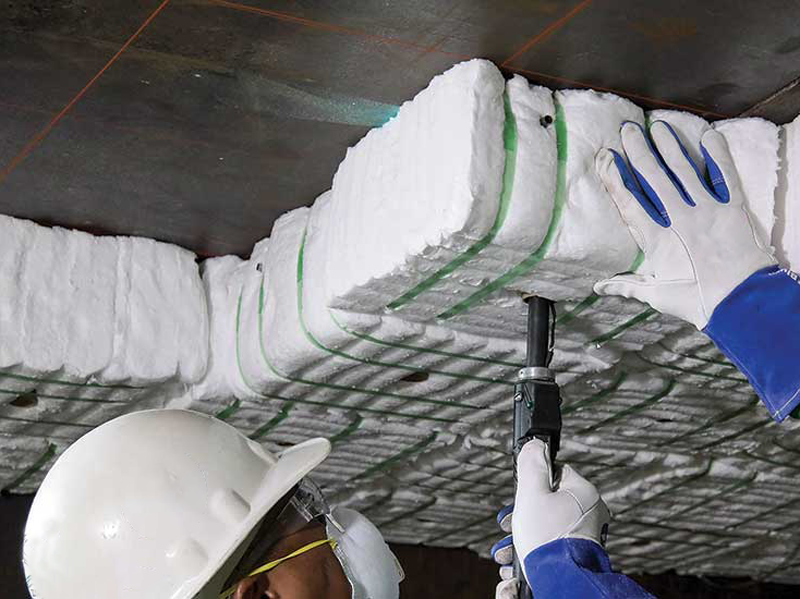Ceramic fiber products, renowned for their versatility, serve as indispensable materials in industries operating under high-temperature conditions. These lightweight and durable products possess exceptional thermal properties, making them crucial components in furnaces, kilns, boilers, and other heat-intensive processes. This article delves into the key characteristics, types, and applications of ceramic fiber products.

Key Characteristics of Ceramic Fiber Products
1. High Temperature Resistance: Designed to endure extreme temperatures, ceramic fiber products typically withstand ranges from 1000°C (1832°F) up to 1600°C (2912°F) and beyond, depending on their composition. They steadfastly maintain both structural integrity and insulation properties, even when subjected to prolonged exposure to high heat.
2. Low Thermal Conductivity: Ceramic fibers exhibit low thermal conductivity, rendering them excellent insulators. They proficiently minimize heat transfer, thereby reducing energy consumption and heat loss in high-temperature processes. This property contributes to maintaining uniform and controlled temperatures within equipment and structures.
3. Lightweight and Low Density: Compared to traditional refractory materials like bricks and castables, ceramic fiber products boast a lightweight nature. Their low density facilitates ease of handling, installation, and reduced structural load on equipment.
4. Thermal Shock Resistance: Ceramic fibers demonstrate exceptional resistance to thermal shock, enabling them to withstand rapid temperature changes without cracking or spalling. This characteristic proves crucial in applications where temperature differentials occur, such as during heating and cooling cycles.

Types of Ceramic Fiber Products
1. Ceramic Fiber Blanket: These flexible and lightweight insulation products, made from ceramic fibers, are available in rolls or sheets. They commonly line furnaces, kilns, and other high-temperature equipment. Ceramic fiber blankets provide outstanding thermal insulation, low heat storage, and enhanced energy efficiency.
2. Ceramic Fiber Board: Compressed ceramic fibers form rigid panels known as calcium silicate board for sale. These boards possess higher structural strength and rigidity compared to blankets, making them suitable for applications requiring structural support, such as furnace walls, combustion chambers, and insulation for high-temperature equipment.
3. Ceramic Fiber Modules: Ceramic fiber modules consist of pre-constructed blocks or modules fabricated from ceramic fibers. Their design allows for easy installation, and they can be affixed to steel structures using various attachment systems. Ceramic fiber modules are commonly used to line furnaces, heaters, and reformers, providing excellent insulation and reducing installation time.
4. Ceramic Fiber Paper: Ceramic fiber paper, a thin, flexible, and lightweight material comprising ceramic fibers, finds utility in gasketing, sealing, and insulation applications that require easy cutting and shaping. It offers commendable thermal insulation, dielectric strength, and resistance to chemical attack.
There is a wide range of refractory and insulation products: https://krref.com/.
Applications of Ceramic Fiber Products
Ceramic fiber products find widespread usage across various industries and applications, including:
– Heat Treatment and Furnaces: They line and insulate heat treatment furnaces, annealing furnaces, and other high-temperature equipment, reducing heat loss and enhancing energy efficiency.
– Kilns and Ovens: They serve as insulation and lining materials in kilns, ceramic ovens, glass melting furnaces, and similar thermal processing equipment, ensuring consistent and controlled temperatures.
– Power Generation: They provide thermal insulation and minimize heat loss in boilers, steam turbines, and other power generation equipment, thereby improving overall efficiency.
– Petrochemical and Refining: They offer insulation and energy consumption reduction in reformers, heaters, and cracking units within the petrochemical and refining industry.
– Foundries and Metal Processing: They insulate ladles, tundishes, and other equipment in foundries and metal processing facilities, maintaining high temperatures and improving heat containment.
Conclusion
Ceramic fiber products, with their exceptional thermal insulation and high-temperature resistance, play vital roles in numerous industrial applications. Whether it is ceramic fiber blankets, boards, modules, or paper, these versatile products provide energy efficiency, reduced heat loss, and improved equipment performance in environments where high temperatures prevail. When selecting ceramic fiber blanket for sale, consider factors like temperature requirements, density, compressibility, and industry-specific standards to ensure the most suitable product for your application.
